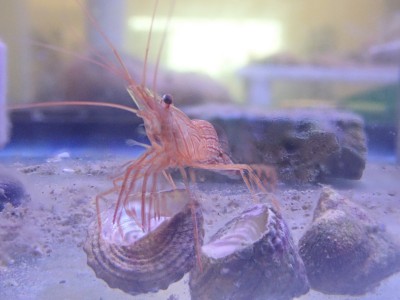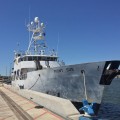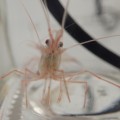NSU Newsroom
SharkBytes
Horizons
This version of NSU News has been archived as of February 28, 2019. To search through archived articles, visit nova.edu/search. To access the new version of NSU News, visit news.nova.edu.
This version of SharkBytes has been archived as of February 28, 2019. To search through archived articles, visit nova.edu/search. To access the new version of SharkBytes, visit sharkbytes.nova.edu.
NSU Research Spotlight: Halmos College – Shining a Light in the Dark with Peppermint Shrimp
In the vast darkness of the deep sea, animals of all sizes swim, crawl, and float in a perpetual search for food. Seemingly oblivious to the world that lies above them, they are still impacted by our everyday decisions and actions. The only thing is: we don’t always know the extent to which they are affected. Researchers must obtain a better grasp of this ecosystem. That is exactly what Halmos College Research Scientist Abigail Renegar, Ph.D., and her team at Halmos College’s Oceanographic Campus research labs hope to accomplish with a series of experiments, including one that focuses on peppermint shrimp.
There are many challenges researchers’ face when studying the deep sea. The first is the cost to collect specimens. This requires research boat time and equipment. Another issue is specimen survival. When collected and brought to the surface, organisms are stressed and may not survive the trip to the lab. Renegar’s research, however, aims to find a solution to these problems. Readily available, peppermint shrimp could be used as a model species in experiments involving the effects of hydrocarbons – the main component of oils – in the deep sea.
A team made up of Halmos College graduate students and faculty plan to study how single hydrocarbons will impact the shrimp. After exposure to varying concentrations for a period of 48 hours, researchers will note what is the lethal concentration to the shrimp. This process will soon be repeated with inhabitants of the deep sea, collected during a research cruise in the Gulf of Mexico. If, after comparing the two populations, similar results are obtained, this experiment could help further our understanding of the deep.


